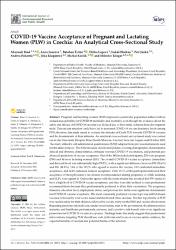| dc.contributor.author | Riad, Abanoub | |
| dc.contributor.author | Jouzova, Anna | |
| dc.contributor.author | Üstün, Batuhan | |
| dc.contributor.author | Lagova, Eliska | |
| dc.contributor.author | Hruban, Lukas | |
| dc.contributor.author | Janku, Petr | |
| dc.contributor.author | Klugar, Miloslav | |
| dc.date.accessioned | 2022-05-11T14:35:53Z | |
| dc.date.available | 2022-05-11T14:35:53Z | |
| dc.date.issued | 2021 | |
| dc.identifier.issn | 1660-4601 | |
| dc.identifier.uri | https://doi.org/10.3390/ijerph182413373 | |
| dc.identifier.uri | https://hdl.handle.net/20.500.11776/8280 | |
| dc.description.abstract | Pregnant and lactating women (PLW) represent a particular population subset with increased susceptibility for COVID-19 morbidity and mortality, even though the evidence about the safety and efficacy of COVID-19 vaccines was delayed due to their initial exclusion from development trials. This unclear situation could have led to increased COVID-19 vaccine hesitancy levels among PLW; therefore, this study aimed to evaluate the attitudes of Czech PLW towards COVID-19 vaccines and the determinants of their attitudes. An analytical cross-sectional survey-based study was carried out in the University Hospital Brno (South Moravia, Czechia) between August and October 2021. The study utilised a self-administered questionnaire (SAQ) adapted from previous instruments used for the same purpose. The SAQ included closed-ended items covering demographic characteristics, clinical and obstetric characteristics, attitudes towards COVID-19 vaccination, and potential psychosocial predictors of vaccine acceptance. Out of the 362 included participants, 278 were pregnant (PW) and 84 were lactating women (LW). The overall COVID-19 vaccine acceptance (immediate and delayed) level was substantially high (70.2%), with a significant difference between PW (76.6%) and LW (48.8%). Out of the 70.2% who agreed to receive the vaccine, 3.6% indicated immediate acceptance, and 66.6% indicated delayed acceptance. Only 13.3% of the participants indicated their acceptance of their physician's vaccination recommendation during pregnancy or while lactating, and 62.2% were against it. Our results agreed with the recent studies that revealed that PW tended to have a high level of COVID-19 vaccine acceptance, and they were also inclined to resist professional recommendations because they predominantly preferred to delay their vaccination. The pregnancy trimester, education level, employment status, and previous live births were significant determinants for COVID-19 vaccine acceptance. The most commonly preferred vaccine type was mRNA-based vaccines, followed by viral vector-based and inactivated virus vaccines. The first top priority of PLW was vaccine safety for their children, followed by vaccine safety for the PLW and vaccine effectiveness. Regarding psychosocial predictors, media/social media, trust in the government, the pharmaceutical industry, and healthcare professionals, partners, and a positive risk-benefit ratio were significant promoters for COVID-19 vaccine acceptance. Findings from this study suggest that promotional interventions targeting PLW should use web platforms and focus on vaccine safety evidence, the expected benefits of vaccines and potential harms of the infection. | en_US |
| dc.language.iso | eng | en_US |
| dc.publisher | Mdpi | en_US |
| dc.identifier.doi | 10.3390/ijerph182413373 | |
| dc.rights | info:eu-repo/semantics/openAccess | en_US |
| dc.subject | breastfeeding | en_US |
| dc.subject | COVID-19 vaccines | en_US |
| dc.subject | Czech Republic | en_US |
| dc.subject | decision making | en_US |
| dc.subject | health promotion | en_US |
| dc.subject | pregnant women | en_US |
| dc.subject | risk assessment | en_US |
| dc.subject | Health Belief Model | en_US |
| dc.subject | Social Determinant | en_US |
| dc.subject | Employment Status | en_US |
| dc.subject | Hesitancy | en_US |
| dc.subject | Medications | en_US |
| dc.subject | Knowledge | en_US |
| dc.subject | Mothers | en_US |
| dc.subject | Media | en_US |
| dc.title | COVID-19 Vaccine Acceptance of Pregnant and Lactating Women (PLW) in Czechia: An Analytical Cross-Sectional Study | en_US |
| dc.type | article | en_US |
| dc.relation.ispartof | International Journal of Environmental Research and Public Health | en_US |
| dc.department | Fakülteler, Tıp Fakültesi, Cerrahi Tıp Bilimleri Bölümü, Kadın Hastalıkları ve Doğum Ana Bilim Dalı | en_US |
| dc.authorid | 0000-0001-5918-8966 | |
| dc.authorid | 0000-0001-7254-9586 | |
| dc.authorid | 0000-0002-2113-1232 | |
| dc.authorid | 0000-0002-6306-8294 | |
| dc.authorid | 0000-0002-1305-6455 | |
| dc.authorid | 0000-0002-2804-7295 | |
| dc.authorid | 0000-0002-9243-6391 | |
| dc.identifier.volume | 18 | en_US |
| dc.identifier.issue | 24 | en_US |
| dc.institutionauthor | Üstün, Batuhan | |
| dc.relation.publicationcategory | Makale - Uluslararası Hakemli Dergi - Kurum Öğretim Elemanı | en_US |
| dc.authorscopusid | 57218221621 | |
| dc.authorscopusid | 57212248838 | |
| dc.authorscopusid | 57225885815 | |
| dc.authorscopusid | 57360035600 | |
| dc.authorscopusid | 14070447800 | |
| dc.authorscopusid | 6506623537 | |
| dc.authorscopusid | 54793450200 | |
| dc.authorwosid | Riad, Abanoub/AAU-7046-2020 | |
| dc.authorwosid | Klugarova, Jitka/V-1108-2019 | |
| dc.authorwosid | Janku, Petr/AAC-7947-2022 | |
| dc.authorwosid | Üstün, Batuhan/AAB-6604-2021 | |
| dc.authorwosid | Pokorna, Andrea/E-5483-2019 | |
| dc.authorwosid | Klugar, Miloslav/E-5748-2018 | |
| dc.identifier.wos | WOS:000738060600001 | en_US |
| dc.identifier.scopus | 2-s2.0-85121314939 | en_US |
| dc.identifier.pmid | 34948987 | en_US |



















